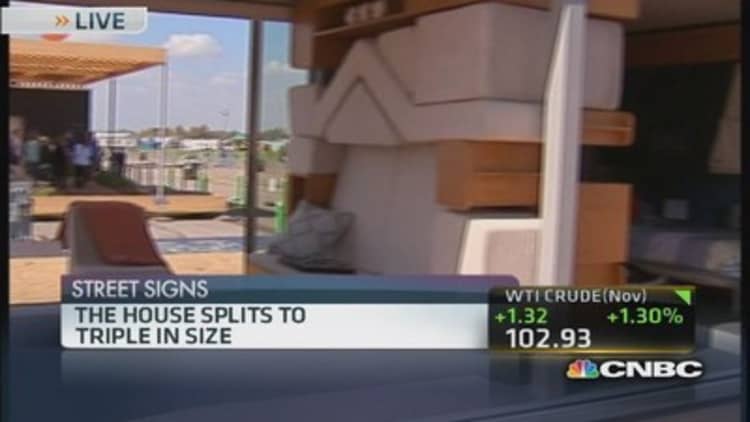Across the U.S., utilities are squaring off against solar in what may be the dirtiest fight in clean energy. In one corner is the industry behind the electrical grid as we've known it, more or less, for a century. The challenger, still a pipsqueak in terms of market share—less than 1 percent of U.S. power—is rooftop solar.
Those rooting for solar were historically environmentally conscious consumers willing to spend more to reduce their carbon footprint, but solar is now economically attractive to a broader base. Some utilities maintain this is because solar customers enjoy benefits at the expense of everyone else on the grid, and they're lobbying to have solar-incentivizing regulations eliminated or replaced.
A key policy being targeted is net metering, which credits rooftop solar users for their power contribution to the grid, a decades-old concept that enjoyed a big boost from the U.S. Energy Policy Act of 2005. The challenger, solar, won the latest skirmish in the war on Thursday, when an Arizona regulator rejected the utility industry's call for new fees of $50 to $100 a month for rooftop solar customers.
David wins round v. Goliath
The decision Thursday by the Arizona Corporation Commission, which oversees utilities in the state, in a 3 to 2 vote, allowed for a new fee of about $5 a month for rooftop customers, which will be in effect until the next rate case by APS, Arizona's biggest utility company, in 2015. The $4.90 fee is not at a level that would impact the economic case in favor of rooftop solar installations. APS spokesman Jim McDonald told the Associated Press that the company was pleased the commission saw the need for fees for solar customers, but was disappointed at the small amount.
"Every utility across the country who wants to stop net metering is going to take note that APS lost despite spending millions and pulling out all the stops," said Bryan Miller, president of the Alliance for Solar Choice and CEO of San Francisco-based residential solar company Sunrun, who had testified before the commission earlier in the day.
We don’t bill a house outside of town more than the one in town, even though it costs more to deliver power to them. But now we’re saying people who self-generate, we’re going to punish them?Francis HodsollFounder, VA Advanced Energy Industries
(Read more: Energy mergers, yes. Neglected grid? Probably not)
The rhetoric in the press in the wake of solar's regulatory victory masks what has been a much nastier war of words and ugly political tactics.
APS has been the subject of unflattering stories detailing how the company has inserted itself into the politics of net metering.
Spat on a hot tin roof
In the latest, an Arizona Republic investigation reported that APS money helped pay for a mailer in support of the three Republican candidates running for Arizona's utilities commission, just days before last year's election.
The donations are not illegal and company officials denied knowledge of them, but APS has policies that prohibit involvement in commission elections.
Sandra Kennedy, an incumbent Democrat who lost her 2012 commission race, told The Arizona Republic that it was difficult to believe APS did not know about the political expenditure in support of her opponent.
"It's kind of hard to say after the fact and after you knocked off two incumbents that happened to be Democrats, 'That was a mistake,' " she said. "Anything the utility companies say I would have to take with a grain of salt."
(Read more: Prairies vanish in push for green energy)
Previously, APS admitted—after earlier denials—that it funded a conservative seniors' group, 60 Plus, that ran ads opposing net metering and characterizing the system as "corporate welfare."
"Credibility is always the issue in a he-said-she-said contest," said Miller.
"APS denied for months they were funding ads," he said. "Now they're admitted liars. You shouldn't lie to your customers and you shouldn't lie to your investors, but it's really serious to lie to your regulators."
APS spokesman McDonald said: "We haven't lied to anyone. We have disclosed what we've known when we've known it." He added that rooftop solar companies have "chosen to make this a political battle—an ugly political battle."
A kick in the head
As the war of words in the press escalated it prompted Arizona's utility commissioner, Robert Burns, to ask that utilities disclose resources spent on campaigns.
APS responded last Wednesday that its parent company, Pinnacle West, spent $3.7 million and some 4,000 man-hours on public relations efforts relating to net metering. APS sought to justify the big spend by stating it had to defend itself against hostile attacks from solar leasing companies.
The utility cited a statement made by Jigar Shah, former CEO of solar project developer SunEdison: "I love kicking people in the head. And this is going to be amazing with Arizona for us to practice this kicking style to see where it goes. ... We're not going to even acknowledge that [net-metering] has any cost to the people."
Shah told CNBC the "kicking in the head" comment didn't originate with him; in fact, it was a comment attributed to the APS that he was asked to respond to at a solar conference.
Nevertheless, Shah said, "In hindsight. I probably should have just highlighted the fact that APS has skyrocketing rates and solar is a good solution for consumers ... many on fixed incomes. My words might be rough, but in light of APS using ratepayer money to inappropriately prevent their customers from accessing cost-effective solar, I felt completely justified in putting the conversation in the light of day."
Burns voiced concerns about campaigning by APS, which he characterized as an energy-providing "machine" that should steer clear of policy debates. "Who is paying for what?" he recently asked in an Arizona Capitol Times article. "I mean, the bottom line is the ratepayers pay for it all, but I think there is a line that should be drawn between APS and Pinnacle West and what they do."
(Read more: Utilities target solar's 'fair share')

The solar barbarians are at the gates of the utility empire.
A report issued by the Edison Electric Institute early this year prodded utilities executives to go on the offensive. "Disruptive Challenges" compared utilities today to the airline and telecom industries before deregulation and technological advances wreaked havoc on them.
Rhone Resch, head of the main solar lobby, the Solar Energy Industries Association, referred to the paper at a conference in October:
"EEI's report singles out distributed generation and solar energy as its No. 1 long-term threat. And since that report was published, utility CEOs around the country have been singing from the same song sheet—roll back net metering, institute fixed monthly charges for solar customers, protect us from consumer choice. They are aligned in their approach to dismantle net metering laws in this country."
Utilities also had an important victory this year: the California Public Utilities Commission released a much-anticipated draft report in September that lent support to the utilities' basic argument: that rooftop solar users are getting more than they're giving through the net metering arrangement, and the result is that nonsolar users (i.e. everyone else in the Golden State) will pay a collective $1.1 billion more a year by 2020.
Fair solar share
Currently there are around 20,000 rooftop solar customers, APS spokesman McDonald said, and it has been "manageable" for the rest of the grid's customers to pick up the financial slack. But with continued rapid adoption, "When we have 50,000, 100,000 or 200,000 rooftop customers, eventually we'll have half the customers not paying and the other half unable to pay," McDonald said. "We need to fix the cost-shifting problem before it becomes so big that it can't be fixed. Rooftop customers are not paying their fair share for the grid," he said.
Bernard Weinstein, an economist with Southern Methodist University's Cox School of Business, said tax credits are fueling the rush into solar, and that net metering is another "implicit subsidy" that shifts costs on to other consumers.
But clean energy backers see the question of fairness differently.
Francis Hodsoll, founder of Virginia Advanced Energy Industries, a business-based clean energy advocacy group in Virginia, said: "We don't bill a house outside of town more than the one in town, even though it costs more to deliver power to them. But now we're saying people who self-generate, we're going to punish them?"
Hodsoll also said that rooftop solar customers reduce the demands on assets throughout the system, and thus reduce the need for grid infrastructure.
(Read more: Sell Treasurys, buy solar bonds?)
Some utilities are taking a more progressive approach than others. NRG Energy, for instance, has put some $1 billion in solar and green-tech investments. Duke Energy has bought into Clean Power Finance, a residential solar financing and design company, and in 2009 invested directly in 10 megawatts of solar distributed across North Carolina rooftops.
Shah also said many utilities have taken a fair and balanced view including Georgia Power, Austin Energy, CPS (San Antonio) and PSEG.
McDonald even said that APS is pro-solar, and has invested billions in solar technologies. But "what the rooftop solar companies are doing is hurting the cause of renewables," he said.
"Do the books completely balance for solar versus utilities? I don't know," Hodsoll said. "But there's a net benefit to the system by having these distributed resources. And if you get rid of net metering, you'd be denying that benefit."
Andrew Ricci, formerly an aide to two congressmen—one a solar advocate, the other from coal country—said both sides are guilty of oversimplifying the issues and playing to the lowest common denominator. He said the playing field has shifted in more ways than one, not just with the rapid adoption of solar and its improving economics, but through the advent of social media—the old monopoly doesn't have quite the advantage it used to.
"People are able to call out APS for lying, and turn what might have been a one-day story into a refrain in the echo chamber" within blogs, columns, comments and tweets, said Ricci, who is now a director with Washington-based public relations firm Levick.
"It really allows individuals to be the new trustbusters," he said.
A CBS affiliate reported that nearly a thousand people had packed the Arizona Corporation Commission's parking lot for a pro-solar rally on Wednesday, and around 300 signed up to speak at the hearing, most of them against the APS plan.
—By Matt Twomey, Special to CNBC.com. Follow him on Twitter @Matt_Twomey.




